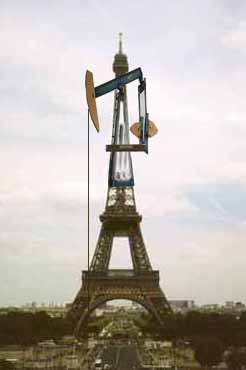
La Grue de Paris, Texas. ©2004 UrbisMedia
Cities come by their names from a variety of sources, the most common probably being named after a founder or favorite son or daughter, a geographic or geological feature, a god or a saint whose blessing it was hoped would provide providential favor upon the anointed place. But when these sources fail to apply or satisfy, cities, like people, may choose to take on the appellation of some famous urban personage from another time and/or place. Such a practice is found, as might be expected, to be more popular in countries and colonies more recently settled and urbanized. In such cases, a newer city taking on the name of a revered ancestor may respond to a need for remembrance or continuity. In other cases the choice might seem gratuitous: Troy, N.Y., Sparta, Mississippi, and Memphis, TN, were probably not settled by even remote descendants of ancient Turkey, Greece, or Egypt. In the U.S. a substantial number of cities, out of nostalgia, expediency, or the desire for character association have adopted the names of foreign cities. Kansas, for example, has cities or towns named Bern, Dover, Dresden, Florence, Havana, Lyons, Milan, Moscow, Oxford, Troy, Utica, and Zurich, among less renowned others. Below is a score of pairs of namesake cities. The spaces correspond to the letters in the name, followed by the country of the “original” city and the state of the American counterpart.
The quiz is no longer available at this time.
___________________________________
©2004, ©2015, James A. Clapp (UrbisMedia Ltd. Pub. 1.1.2004)
